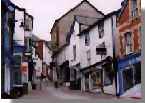Welcome To knighton
We still had sorrows to lighten,
One could not always be glad,
And lads knew trouble at Knighton,
When I was a Knighton lad.
A.E. Houseman: A Shropshire Lad
Knighton.
A town that straddles King Offa’s eighth-century border as well as the
modern
Wales-England divide, Knighton (Tref-y-clawdd, “the town on the dyke”),
twenty miles northeast of Llandrindod, has come into its own as the most obvious
centre for those walking the Offa’s Dyke Path. Located almost exactly
halfway along the route, Knighton, although without many specific sights, is
a lively, attractive place that easily warrants a stopoff.
Knighton is the only original settlement on Offa’s Dyke, and today there
is still a distinctly medieval look to the town, which clings to the side of
a steep hill above the River Teme. St Edward’s Church sits at the bottom
of the hill, and the main road climbs past a 19th century clock tower set in
the middle of the bustling marketplace. From here it’s a long haul up
the traffic-free ‘Narrows’, now lined with small shops, to the summit,
where a Norman castle once stood.
In Norman times, Knighton was a walled town and had two castles. Bryn-y-Castell,
the earlier one, was to the east of the town and was probably only a superior
motte and bailey affair, for an earth mound is all that remains. The later castle
was of stone and was built by William de Braose in the 12th century. The site
he chose was high over the town at the top of The Narrows. Eventually the castle
was acquired by those mightiest of border barons, the Mortimers. This was an
honour Knighton could have well forsworn  since
the name of Mortimer seems to have been synonymous with battles; battles to
seize properties and battles to retain them. Their history was long and bloody
and in 1260 when, true to form, they were hotly engaged in a war with Llewellyn
the Last, Knighton was attacked by the Welsh, and Castle and town were burned.
Nearly a century and a half later, in 1402, Owain Glyndwr was ravaging the country
and Knighton castle was again burned and Edmund Mortimer defeated in a great
battle at nearby Pilleth. since
the name of Mortimer seems to have been synonymous with battles; battles to
seize properties and battles to retain them. Their history was long and bloody
and in 1260 when, true to form, they were hotly engaged in a war with Llewellyn
the Last, Knighton was attacked by the Welsh, and Castle and town were burned.
Nearly a century and a half later, in 1402, Owain Glyndwr was ravaging the country
and Knighton castle was again burned and Edmund Mortimer defeated in a great
battle at nearby Pilleth.
|

